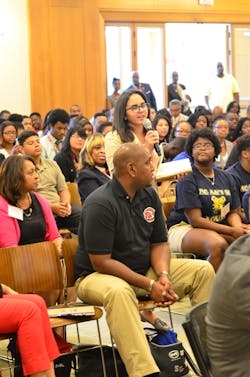Growing up in Jackson, Mississippi, Mioshi Moses didn’t have much experience with public transportation and her perspective, she said, was completely skewed. When she was looking at the opportunity to lead the Conference of Minority Transportation Officials (COMTO), she did a little research and learned about an industry she experienced daily but never thought about — transportation.
“I feel it’s like air,” she said. “You don’t really think about it until it’s gone.”
Moses is the president and chief executive officer of COMTO, a non-profit association with a mission to ensure a level playing field and maximum participation in the transportation industry for minority individuals, businesses and communities of color through advocacy, information sharing, training, education and professional development.
A New Opportunity
Moses is a trained attorney with a specialty in tax law and previously worked at Ernst & Young’s National Tax Department. She also has experience working for consulting firms, including Booz Allen Hamilton, and focused on change management, strategic planning and business process improvement.
Most recently Moses was vice president of membership and chief operating officer of Leadership Greater Washington, a non-profit organization which provides professional development for top leaders in the Washington metropolitan region.
“When I met the [COMTO] board, I was looking for a new opportunity,” Moses explained. “I was a COO of a non-profit and was looking for an opportunity to lead an organization in a unique position and heard about the opportunity at COMTO.”
When doing her background research, she saw how interesting and unique the transportation industry is, particularly at this time. “There are so many changes happening that this is an exciting time to be in the industry.” She continued, “It’s fourth in terms of producing GDP [gross domestic product], which is amazing.”
While it felt like a very huge industry, when she started to learn more about what transit is about, she realized it was very close-knit and thought that was unique. She saw that people move around, everyone knows how it is that’s moving and they know the up-and-comers and she liked that. “I think that’s a comforting feeling and it’s something that’s not touted enough.
“That’s one of my goals, to shout it from the rooftops how wonderful this industry is.”
She said learning more about COMTO and understanding the mission of focusing on expanding opportunities for all minorities in this country and she thought it was such a noble missions, she wanted to be a part of it.
A Multi-Modal Organization
COMTO has 39 chapters throughout the United States and members include individuals, transportation agencies, academic institutions, non-profits and historically underutilized businesses (HUB). “We are a multi-modal organization,” said Moses. “It’s pretty unique in the space that we’re in.
“Most organizations are focused on one particular industry and what we’ve found is that we want to be as expansive as possible.”
She said they bring people of different modes together and with the conversation being on best practices, it’s fascinating to see everyone contributing to the conversation and taking something useful from the conversation.
“I believe diversity of perspective is what results in creative problem solving. You may have someone that’s focused on transit and that has been focused on transit and that’s what they know. But then you have someone in aviation and you may find they have an interesting, different take on it because they’re talking with the aviation people who may see things a little differently,” said Moses.
“The whole idea of COMTO being a very diverse organization is because we believe in the fundamental truth that diverse perspectives, people coming together from different experiences and backgrounds, can really come together to solve some of our challenges.” She added, “They can come up with creative solutions and really make the country stronger and move forward in a positive way.”
When the COMTO board first shared their stories of how they got into transportation in the first place, Moses said a couple of them talked about started out in the bus depot and became GMs of huge transit systems or how they were in college and sort of stumbled in to transportation. “I realized this is something that can really transform someone’s life. Transportation can change your station in life; you can change the way you live through an opportunity in transportation.”
At the COMTO national meeting, where all of the membership comes together, Moses said it was an amazing experience and she knew it was the right place to be when seeing the passion and excitement. Something else that she felt, was that it was like family. “I could feel that … and that just solidified my decision.”
What they do at COMTO, she further explained, is making sure that their members are aware of the opportunities when they come around and also are prepared in whatever way they need to be to be strong and ready to handle those situations. “That’s where we provide support. Professional development training through our networks.
“There’s always going to be a challenge when you have large companies. It’s learning where the opportunities are and being able to fully take advantage of them,” she said. They’re continually looking at how they can strengthen their hubs, their small minority-owned and women-owned businesses to be able to be as competitive as possible. “We’re going to provide them with the support they need.”
Providing Opportunity
Each of the 39 COMTO chapters has a vision of supporting small businesses, minority-owned and women-owned businesses, and bring young people into the industry. Each chapter may do things a little differently but they do a variety of things that further COMTO’s mission.
Many, Moses explained, have a Garrett Morgan Day, typically a career fair, in honor of the African American engineer Garrett Morgan. There are also luncheons and activities to raise money for scholarships that they provide to young people in the community who are interested in transportation.
There are also workshops and seminars where the chapters bring together local and national leaders in transportation to talk about the issues. Bonding is a big issue for the HUBs right now, Moses said, so a lot of the chapters are having workshops and seminars on those types of issues, bringing together local contractors and local entities who are issuing contracts and bringing them together.
“That’s what is happening around the country and that is how COMTO is making a national impact,” said Moses.
In observance of Women’s History Month, COMTO’s Women Who Move the Nation celebrates women in transportation. This upcoming year will be the fifth anniversary of Women Who Move the Anniversary and it provides COMTO the opportunity to recognize women nationally — all modes of transportation.
“We honor them to really show the world that 1. Women are making great strides in doing great things in this male-dominated society, but also to show our young men and women that there are opportunities for women to really get into the transportation industry,” Moses said. “We like to say we bring the uninitiated in to the fold and make them aware, have them understand how great this industry is and what the opportunities are.”
Women Who Move the Nation 2016 will be March 16 in Washington, D.C. Moses said, “We’re going to have our celebratory breakfast and we’ll honor 10 to 12 fantastic women across the country.
A program COMTO has had for many years is its CITY Intern program, geared toward introducing young people to the transportation industry.
“Our members are people who run transit agencies, companies, small businesses. We like to introduce college juniors and seniors to them through an internship program,” explained Moses.
There’s an application process, they select students and there’s a 10-week program that begins in January and ends in August.
“In the middle of it we take all of the students and bring them to our annual conference,” said Moses. “At the conference we want to introduce them to all of the leaders. The idea is they’ll have the opportunity to meet all of the top leaders in transportation in one setting.”
Moses continued, “We do a buddy mentoring-type program with some of the leaders and some of the interns but what we do, most importantly, is we have a track just for them. We’ll have a youth symposium on the first day and then we go into a full program track with them where they meet different people.
“It’s about understanding transportation, it’s learning how to advocate for transportation issues. It’s a real strong program that we give the students and what we’ve found afterward, it’s a really great way to move young people into the industry.”
Moses also said that a lot of them get a full-time job with the company, organization or agency they interned with or within somewhere else in the transportation industry.
Moses said, “Once you join the COMTO family, we never let you go. We will always help to assure those opportunities.”
Looking to the Future
When Moses came to the transportation industry she said people talked about how it’s been the same for a significant period of time and recently, people have been using the term “disrupted.”
“I don’t really like that term because it sounds negative,” Moses said, “ but so much has exploded in all these different ways of looking at transportation and how to move people and things from Point A to Point B.
“I think it’s a challenge and an opportunity during this exciting time.” She added, “I think how our traditional entities manage the rapid pace of change that’s happening, that’s going to be a challenge.”
One of the things she and COMTO believe is that diversity and perspective is key to a strong future. “You need diversity of thought. That’s the benefit of having organizations that support minorities … so that they can sit at the table and provide that diverse perspective, that unique perspective,” Moses said.
“Women have a very different walk through life then men do and that perspective needs to be had. Bringing all of that together needs to be heard. Bringing all of that together is how we keep this country strong. Everyone needs that. They may not understand it, but we truly believe that it is needed.”
With a fresh perspective of the transportation industry, Moses pointed out that it’s a really cool industry. Moses has a brother that’s much younger than she is and when she told him he got this job, she said he looked at her like she was crazy. “He didn’t understand it.
“Now that I’ve learned more, I’m sharing more and he’s getting engaged and he’s asking questions about different things,” she said.
“Little parts of the industry are changing so rapidly; it’s very fascinating.
The thing that people don’t know is that it’s a really cool place to be; it’s a really cool area to work in.
“I think if we can really convey that message, we can get a lot more people thinking about transportation and a lot more people interested in transportation and a lot more people wanting to work in transportation.”


